|
The following are the overheads used in this presentation:
Overhead 1
Core Evaluation Key Questions
- What is the overall quality of the LSC professional development activities?
- What is the extent of school and teachers involvement in LSC activities?
- What is the impact if the LSC professional development on teacher preparedness, attitudes, and beliefs about science and mathematics teaching and learning?
- What is the impact of the LSC professional development on classroom practices in science and mathematics?
- To what extent are the district and school contexts becoming more supportive of the LSC vision for exemplary science and mathematics education?
- What is the extent of institutionalization of high quality professional development systems in the LSC districts?
Overhead 2
Strengths of LSC
Professional Development
- Relevant to teachers' work in classrooms
- Model effective instructional strategies
- Provide opportunities for reflection
- Provide on-going support
Overhead 3
Areas of Need
- Balance between content and pedagogy
- Consistency of quality
Overhead 4
Rating the Professional Development Program
|
QUESTION
|
EVALUATOR RESPONSIBILITY
|
|
Does the program attend adequately to increasing teacher content knowledge in ways that are likely to improve classroom instruction?
|
Understand project strategy for increasing content knowledge; observe sessions which address that goal.
|
|
Is there appropriate attention to closure, if not to individual sessions, then to groups of sessions ("units") to teachers know which are the key ideas?
|
Schedule observations to be sure to observe the conclusion of a set of activities.
|
|
Does the professional development address classroom practice deeply and well, including both modeling effective practice and making it explicit?
|
Attend to this facet in observations.
|
|
If program design includes a variety of partners responsible for professional development, is there adequate orientation/coordination?
|
Attend to this facet in interviews with project staff, as well as in observations.
|
|
If the program design includes teacher leaders, are they being adequatley prepared for, and supported in, their roles?
|
Schedule observation of session that deals explicitly with leadership content, as well as sessions conducted by teacher leaders.
|
Overhead 5
Modifications to the Core Evaluation
- Classroom Observations
7 treated, 3 untreated per targeted "subject"
- Observation and interview samples will be a subset of TQ sample; maximum 2 activities per teacher
- Minor revisions to PDOP, COP, Interview Forms; we will send revised forms to PIs and evaluators ASAP
- PIs need to understand systems they are trying to change. We will revise QV ad QVI rating forms based on evaluator feedback and send to PIs and lead evaluators. PI can use to initiate discussions at the district level; evaluator talks with teachers; PI and evaluator collaborate in completing the forms.
Overhead 6
Lessons of "treated" teachers were rated particularly high on the extent to which:
- The discipline was portrayed as a process of inquiry, and the lesson incorporated tasks, roles, and interactions consistent with inquiry;
- The room arrangement encouraged student-centered interaction;
- Students were encouraged to generate ideas, conjectures, and propositions;
- Concepts and processes were balanced appropriately; and
- The degree of closure or resolution of conceptual understanding was appropriate for the purposes of the lesson.
Overhead 7
Core Evaluation Reminders
- Claudia Templeton is the official HRI contact person at lsc@horizon-research.com.
- HRI maintains a contact list with one PI and one Lead Evaluator name per project. Let Claudia know if you wish to change the PI or Lead Evaluator contact person.
- Please send HRI your targeted teacher file at least a month before you need the questionnaires and observation samples.
- Only "certified" observers may do classroom observations for the core evaluation.
- Training sessions for classroom observers have been scheduled in
Chapel Hill, NC February 2 & 3, 1998
San Francisco February 9 & 10, 1998
Chicago February 12 & 13, 1998
Overheads of Figures
Fig. 74 Resources to Support On-going Professional Development, p 100
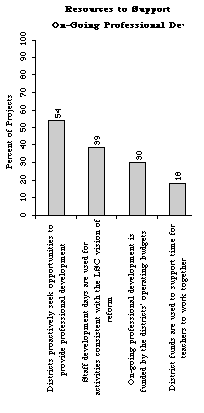
Fig. 64 Teachers' Perception of Support from Colleagues, p 87
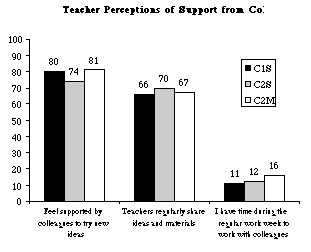
Fig. 52 Cohort 1 Teachers Feeling at Least Fairly Well Prepared, p 71
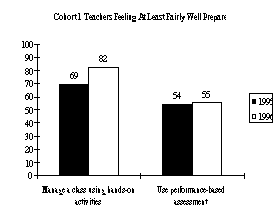
Fig. 50 Lessons with High Ratings for Classroom Culture, p. 70
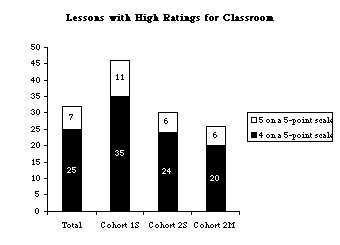
Fig. 49 Lessons with High Ratings for Content, p 69
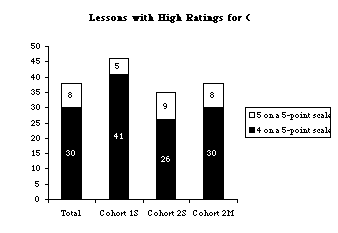
Fig. 48 Lessons with High Ratings for Implementation, p 68
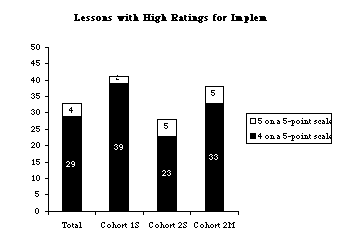
Fig. 47 Lessons with High Ratings for Design, p 67
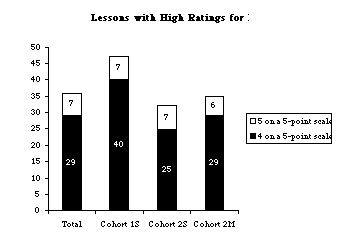
Fig. 69 Teachers Labeling Each a Major Problem, p 92
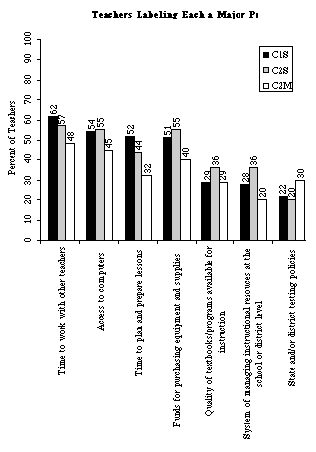
Fig. 35 Assessment Strategies: Comparison of Teachers Responding "Very Important" and "Very Well Prepared: to Use Various Strategies, p 53.
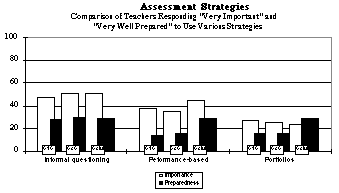
Fig. 34 Instructional Strategies: Comparison of Teachers Responding "Very Important" and "Very Well Prepared: to Use Various Strategies, p 52.
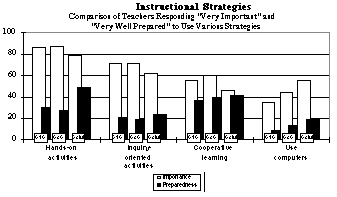
|

